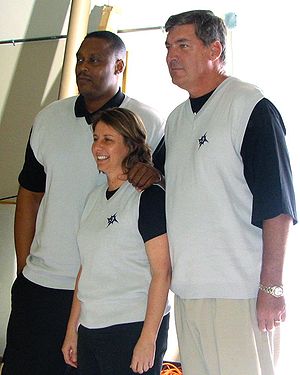5 Points to Keep in Mind when Selecting Coaching Staff
Selecting the right support Coaching Staff can be a very challenging role for any Head Coach. Whether you are choosing support staff for a professional program or the club team on a Saturday morning the right coaching staff can make a big difference in the overall effectiveness of the program. Having functional coaching staff around the Head Coach only serves to maximise the benefit to the players and program as a whole.
While coaching many coaches look to a number of different strategies to help get the most out of their time and effort. In no activity is this time more justified then in the recruitment and selection of the right coaching staff to assist a Head Coach on the floor day in and day out. The coaching staff will be the “right hand” of the coach and need to be able to adequately support the coach’s philosophy or they can be more of a detriment then a benefit.
The first point is the ability to commit to the program; in every situation the most problematic issue a Head Coach will face with his staff is the ability to be able to count on them throughout the course of the season. This means the pre-season, competition phase and post season. It does not matter how many training sessions the program has, a support coach needs to be in attendance for all practices. Anything less and they exemplify what is wrong with the program instead of what is needed to achieve the best results.
The second point is the knowledge to be able to challenge your coaching; this point is especially important for your immediate Assistant Coach. Your First Assistant Coach should be able to provide a different perspective on a wide range of sports specific coaching activities. From drill selection and application of technical and tactical skills within the training and game environments. When you look to this coach at a training session or game you want them to be able to provide an alternative solution or insight to what is happening. This will help your coaching by providing a greater range of options and considerations for when an informed decision is necessary.
A common issue in this situation is a Head Coach feeling they are not supporting their senior assistant if they do not agree with their point of view. Always remember the final decision is yours to make and you have to be accountable for the consequences. For this reason you should always use your better judgement and back your experience and knowledge to make the right decision. Sometimes you will agree with your coaching staff other times you will not.

The third point is the ability to compensate for your weaknesses; as an experienced coach you should be on an ongoing basis reviewing your own coaching style and sports specific knowledge. This will help you become aware of your weaknesses and strengths in your coaching style. When equipped with this knowledge you are then able to look for characteristics and knowledge within your support coaching staff that will fill gaps in this knowledge. An example of this might be the selection of an assistant coach who is particularly strong in technical skills development if you are not overly proficient in this area.
Just because you are a Head Coach never be of the mind that there is nothing that you need to learn further. In watching and listening to your assistants you too can benefit from the relationship as they indeed will benefit from coaching with you.
The fourth point is the ability to have confidence in your coaching staff; when selecting your support staff always be looking past what the coach is now, and think about their potential development into the future. Can this coach be a person you have trust and confidence in? Could this person be trusted with running a drill now and a training session later? These types of questions will help you find the right person for your group, as it will help match the experience and competence of the possible coaching staff member with the ability and standard of your team.
No Head Coach can be everywhere all the time and this is especially true with professional programs. Having the confidence in your coaching staff to be able delegate individual training sessions or some other aspect of regular training will be a necessity at some point in time.
The final point is help build the coaching fraternity; as an experienced coach it is your responsibility to help give junior coaches an opportunity to gain experience and knowledge. While selecting a junior coach might not be the right option as your first assistant, they are definitely the right choice thereafter to help not only fill vital roles within your squad but also provide a pathway for future development of the sport.
Ensure that your junior coach does more than handout and collect towels. To fulfil your commitment to supporting a junior coach you must give them the opportunities necessary to develop the widest possible range of skills during their time within your program. In this way they potentially will carry on your legacy as a coach and as a role model for the next generation of players or coaches.
Selecting the right coaching staff will always be a challenge for any number of reasons. For many coaches they will have to seek out perspective coaching staff members to help support their program. This is especially the case in junior programs or programs with a low profile. In senior and elite programs the challenges will be different, like selecting the right personnel. The challenge is very demanding and this is reflective of the importance of roles these for your program. Take the time needed, and make the best choice for you and your team.


